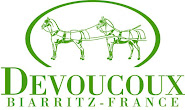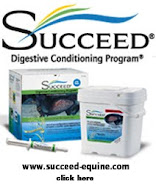Welcome back to Dr. Schramme's interview for Three Days Three Ways. Read on for vet issues at the 2008 Olympics, those specific to eventers, and how event horses are so special.
Q. What kinds of issues did you see while there?
A. The first issue was about climatological conditions. The heat and humidity. There was enormous attention paid to making sure horses were hydrated and cooled. Every stable had air conditioning and misting fans attached to cooling tanks. That was the first big issue. On the whole we were lucky with the weather. For instance, with cross-country, there was a light drizzle. The sun never really came through very harshly and it rained slightly throughout. So it was the perfect climate for horses. Even for the finals of showjumping there was a typhoon announced. Since it was windy it cooled a bit and the typhoon didn’t come till then next morning. But that was a bit of chaos since the airport closed--but for the horses it cooled things a bit for the evening of the showjumping final.
The other thing you come across with competition horses, from my point of view, is mainly tendon and ligament concerns. We did more ultrasound examinations than radiographs. Horses would come up inexplicably lame the day before the competition and that kind of stuff. Tendon and ligaments are the main issue at that level.
Another problem if you travel these long distances is called “shipping fever”. It’s basically pneumonia. We want to make sure they don’t contract something like that.
Then there was the odd sick horse or horses not doing quite right.
Q. What was the most serious injury that you dealt with?
A. One of the eventing horses finished a course but had fracture a proximal phalanx. So that horse had to be transported back to the clinic with a splint. I think it had four screws put in then it was recovered in a cast and went home to Sweden.
Q. Was the smog a problem or concern or was it just a story?
A. No, not nearly as bad as in Beijing.
Q. Did you have a good time?
A. Absolutely, fantastic. I made some good friends from the vet team. I met some people from different countries that you usually don’t meet. There’s a lot of bonding that goes on. We were working towards a common goal and all the eating and sleeping is all pretty much done together. It was a good experience.
Q. What did you and the other vets do when you weren’t working?
A. I left this out conveniently! There were provisions for some time off. So we’d go shopping in Hong Kong. What else do you do in Hong Kong? We went shopping. You explore, go visit things. My family was out there too so we visited some sights and saw some places. We didn’t quite go to Disney Land with the kids but we saw some other things.
Q. Are there specific veterinary issues that you find specific to eventers?
Ligaments, tendons and heat stress since those [eventers] are the ones that go the hardest. Showjumpers and dressage horses don’t perform at the maximum level of exertion. But eventers have to be concerned about heat stress and that’s where climate comes in again. And since they go at top speed they get more tendon and ligament issues.
Q. What can eventers do to keep their horses sound and healthy?
A. One of the things these teams do is that they have very regular vet check ups. There’s no way of predicting when a horse will injure itself. But one of the advantages to this close monitoring is early intervention. That’s often the key. Not just from a fitness point of view but also from an injury point of view.
One thing I noticed it’s a different type [of horse]-- a different group of horses. These horses are better able to deal with chronic, low-grade, niggling injuries. You wonder why these horses aren’t more lame with the injury? Whether it’s a mental ability to discard pain or a love for the job. But you kind of have to throw out the rulebook in assessing injuries and whether a horse can perform with that injury. You think the average day-to-day patients will need two months off. But a lot of these [event] horses will keep going--and keep going well. The term the riders use is that the horses have a big heart. There’s a huge mental part of it. It’s not just physical. It’s how do they deal with an injury or niggling pain that would put another horse out of action. It’s not just a question of keeping a champion healthy. It’s how big is the horse’s heart as far as wanting to perform and enjoying the job? That’s a big difference from every-day vet practice that you have to get used to.
Even though sometimes have to protect horses against themselves you can’t just always stay on the safe side of the fence and say there’s a risk that this may effect the horses performance when the horse is able to continue to. Also, there are things the riders know better than you do as a specialist. You can’t just come in and make decisions. To be honest, the rider and the vet know more about the horse and how best to deal with it. So you give advice and you try and help them with things like should the horse continue or does it need to go for long-term rest? You can’t just make those decisions on a strictly textbook basis.
Q. Is there anything else you want to add?
A. One thing that was really outstanding was the organization provided by The Hong Kong Jockey Club. Their logistics team was outstanding. Nothing was left to chance. There was a contingency plan for everything from bad weather to terrorism. Sometimes it was hard on us have to be there so early! It was remarkable and very well prepared. I’m sure Olympic horses have never had this kind of care and attention that they received there. Everything was purpose built. Everything was brand new. It was a privilege to be a part of it.








